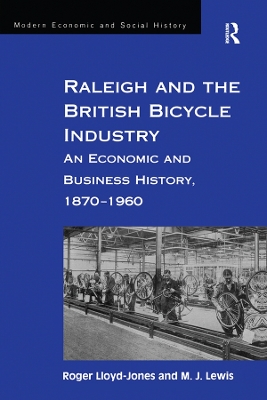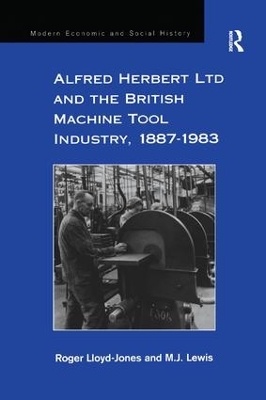Modern Economic and Social History
3 total works
Raleigh and the British Bicycle Industry
by Roger Lloyd-Jones and M. J. Lewis
Published 20 March 2000
This book is the first comprehensive history of the development of the British bicycle industry from the perspective of business and economic history. Focusing on themes such as entrepreneurship, personal capitalism, and organisational, technological and cultural change, the shifting fortunes of the industry are traced through the business history of one of its leading firms, Raleigh. The history of the company is then set within the context of more general trends in the industry’s evolution over three chronological periods: 1870 to 1914, 1914 to 1939, and 1939 to 1960. In addition to the story of Raleigh, the business activities of other leading bicycle firms such as Rudge-Whitworth, Hercules, BSA, J. A. Phillips and BCC, the bicycle division of Tube Investments, are examined to inform our understanding of the business evolution of the industry. The book demonstrates that the British bicycle industry was both tenacious and dynamic, typified by the personal leadership of entrepreneurs such as Frank and Harold Bowden at Raleigh.
Personal Capitalism and Corporate Governance
by Myrddin John Lewis, Roger Lloyd-Jones, and Mark David Matthews
Published 1 January 2011
This book is specifically aimed at addressing a gap in the study of the evolution of corporate governance in Britain. In particular its key theme, the relationship between corporate governance and personal capitalism in British manufacturing in the first half of the twentieth century, provides the means for a systematic and critical examination of the dominant Chandlerian paradigm that the long-running persistence of personal capitalism shaped the governance of British manufacturing firms well into the twentieth century and acted to erode their competitive performance. The book helps to identify those aspects of corporate governance that have undergone change, with some critical observations on the magnitude of change and those aspects which have displayed characteristics of continuity. The empirical spine of this book is set out in a series of case studies which provide the basis for the examination of corporate governance in Britain during the period c. 1900 to 1950. By focusing particularly on the responses of a range of businesses to the turbulent environment of the inter-war years, this volume offers an insight into a much neglected, yet vital, area of business and economic history.
Alfred Herbert Ltd and the British Machine Tool Industry, 1887-1983
by Roger Lloyd-Jones and M. J. Lewis
Published 28 September 2006
At the beginning of the twentieth century Britain was amongst the world leaders in the production of machine tools, yet by the 1980s the industry was in terminal decline. Focusing on the example of Britain's largest machine tool maker, Alfred Herbert Ltd of Coventry, this study charts the wider fortunes of this vital part of the manufacturing sector. Taking a chronological approach, the book explores how during the late nineteenth century the industry developed a reputation for excellence throughout the world, before the challenges of two world wars necessitated drastic changes and reorganisations. Despite meeting these challenges and emerging with confidence into the post-war market place, the British machine tool industry never regained its pre-eminent position, and increasingly lost ground to foreign competition. By using the example of Alfred Herbert Ltd to illuminate the broader economic and business history of the British machine tool industry, this study not only provides a valuable insight into British manufacturing, but also contributes to the ongoing debates surrounding Britain's alleged decline as a manufacturing nation.


